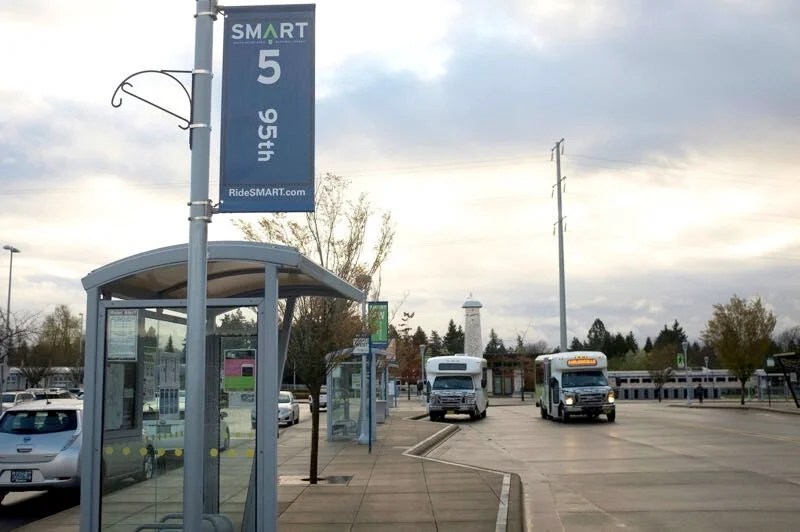Wilsonville joins lawsuit over federal grant conditions imposed by Trump administration
Published 5:45 pm Thursday, May 29, 2025

- An image of a bus stop at the Wilsonville Transit Center. (Staff File Photo)
Wilsonville is now part of a “coalition” of local municipalities and transit authorities around the country filing a federal lawsuit over new conditions placed on previously-awarded federal grants — including terms related to immigration enforcement and diversity, equity and inclusion.
According to a press release, the city joined a lawsuit filed May 21 in the U.S. District Court for the Western District of Washington against the Trump administration’s Department of Housing and Urban Development and the Department of Transportation. The lawsuit “challenges the (Trump) administration’s addition of unlawful conditions placed on jurisdictions in order to receive federal funding for public transit and homelessness assistance.”
“The U.S. Department of Housing and Urban Development (HUD) and theU.S. Department of Transportation (DOT) … seek to impose conditions on funding, provided through congressionally authorized federal grant programs, to coerce grant recipients that rely on federal funds into implementing President Trump’s policy agenda, and direct them to adopt his legal positions, contrary to settled law,” the lawsuit reads.
Trending
Other jurisdictions involved in the lawsuit include King County in Washington and the cities of Boston, Chicago, New York and San Francisco.
The announcement follows an approval from the Wilsonville City Council during a meeting on Monday, May 19, which gave City Attorney Amanda Guile-Hinman permission to “engage in affirmative litigation” seeking to protect the city’s ability to receive federal funding.
“Based on a template of the 2025 Federal Transit Administration master agreement for all FTA grants, staff will not be able to sign the master agreement in its present form due to terms that the city cannot comply with,” Guile-Hinman said during the meeting. “Particularly terms around assisting in immigration enforcement, due to a state law that prohibits the city in doing so.”
Oregon sanctuary law, adopted in 1987, prohibits law enforcement or government officials from cooperating with federal immigration enforcement in the absence of a judicial warrant.
The release said the Trump administration added “several unlawful conditions” to the transportation department’s Federal Transit Administration Master Agreement, which covers grants awarded to Wilsonville through the South Metro Area Regional Transit department for transit operations.
The lawsuit alleges that the conditions are unconstitutional and “an overreach by the executive branch,” which does not have authority to change conditions on federal grants “without explicit approval” from Congress.
Trending
Specifically, in written testimony obtained by the Wilsonville Spokesman, city transit department grants and programs manager Kelsey Lewis said the new grant agreements “purport to prohibit diversity, equity and inclusion” and include requirements related to immigration “verification and enforcement” as well as abortion.
Lewis added that “these newly imposed conditions are nearly impossible to meet,” citing the Oregon sanctuary law as an example.
The lawsuit said that the conditions put Wilsonville and other jurisdictions at risk of taking actions conflicting with local and state laws in order to receive the federal funding.
The release gave the example that if the city agreed to demands to “assist federal immigration enforcement,” it may face civil liabilities under state law. On the other hand, if the city did not comply with the federal terms it could be “liable to the federal government for three times the amount of the grant.”
What grants does the city receive?
The lawsuit, obtained by the Wilsonville Spokesman, said SMART relies on approximately $1 million in Federal Transit Administration grants as a whole each year.
According to Lewis’ testimony, federal grants received by the city’s transit department include Section 5307 Urbanized Area Formula Funds, Section 5310 Enhanced Mobility of Seniors and Individuals with Disabilities funds and Bus and Section 5339 Bus Facilities Formula Program grants, which are each awarded to the city and other areas based on legislative formulas. The department uses these funds to buy new buses, as well as software or technology to improve data collection and customer experience. Funds are also used to perform preventative maintenance on buses and preliminary engineering on bus maintenance facilities.
The department has also received competitive grants to buy battery electric buses, Lewis wrote. Through the Metro regional government, the department receives federal funds for transportation options programming as well.
Lewis wrote that the city receives about $500,000-750,000 in Federal Formula funds per year, and the city’s budget document for the upcoming fiscal year estimates approximately $727,000 in estimated formula grants for the next year plus $177,250 in local match funding. The budget document also shows the city expects $160,000 in federal grants plus $18,312 in local match funding to support the SMART Options and Safe Routes to School programs.
In the current fiscal year Lewis wrote the city received just over $1 million in federal formula funds for bus preventative maintenance, software, security equipment and operator safety materials.
The release said the conditions placed on Wilsonville and other jurisdictions put “critical services for residents at risk.” In the written testimony, Lewis wrote that without federal funding the transit department would “likely have to discontinue its Commuter and Safe Routes to School programs”
“We have a duty to protect these important services for the many community members who utilize SMART’s services,” stated City Manager Bryan Cosgrove in the release. “That is why we joined other jurisdictions from around the country — to protect our transit services and Congressionally-approved processes and to prevent the bullying of local governments into compliance with a political agenda at the expense of delivering critical services.”







